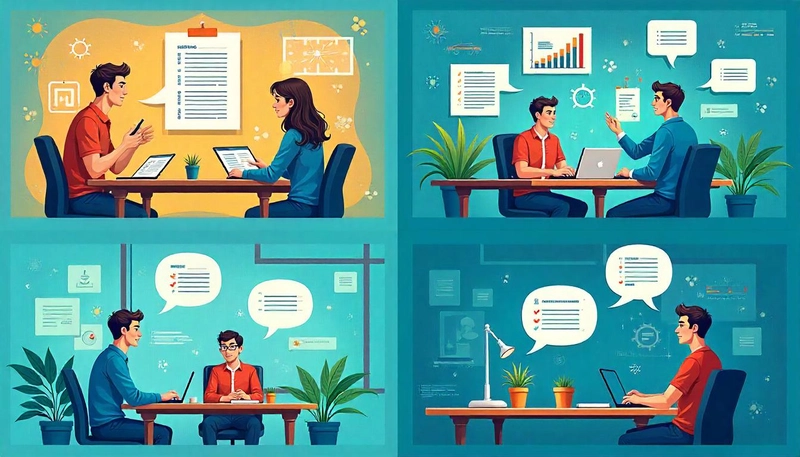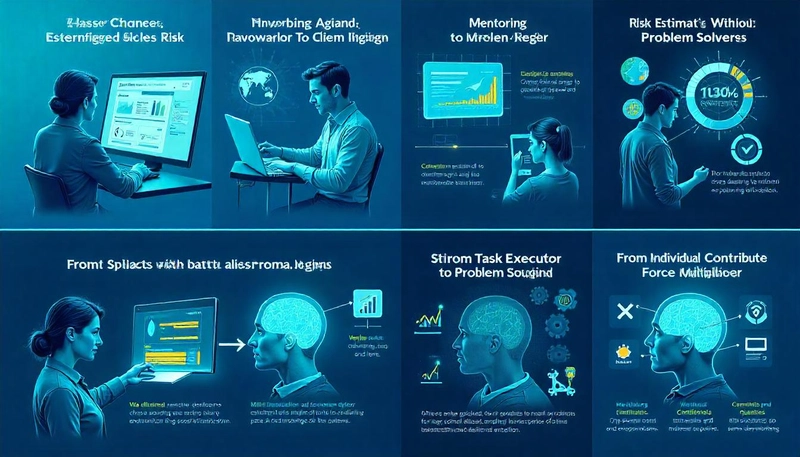Table of Contents
1. The Hidden Skills Gap
2. Technical Leadership Beyond Coding
3. Communication and Stakeholder Management
4. Project and Team Management
5. The Mindset Shift That Changes Everything
6. Building Your Senior Developer Portfolio
7. Common Roadblocks and Solutions
8. Your Next Steps Forward
Introduction
Most developers think the path from junior to senior means writing better code. They focus on algorithms, design patterns, and the latest frameworks. Yet many talented developers with strong technical skills remain stuck in junior roles for years.
The real progression requires skills that coding bootcamps don't teach and senior developers rarely discuss openly. This roadmap reveals what actually separates junior developers from senior ones.
Manage Project Smartly with Teamcamp
The Hidden Skills Gap That Keeps Developers Stuck
Technical competency gets you hired. Non-technical skills get you promoted.
Research from Stack Overflow's 2024 Developer Survey shows that senior developers spend only 30% of their time writing code. The remaining 70% involves communication, mentoring, technical decision-making, and project coordination.
Junior developers often miss this reality. They believe that mastering React hooks or learning Kubernetes will automatically advance their careers. While technical growth matters, the promotion bottleneck exists elsewhere.
The Three Pillars Most Developers Ignore
1. Communication becomes your superpower
Senior developers translate technical concepts for non-technical stakeholders. They write clear documentation, lead meetings effectively, and explain complex systems in simple terms.
2. Business context drives technical decisions
Understanding why features exist matters more than how to build them. Senior developers align technical choices with business goals, estimate project impact, and suggest alternative solutions.
3. Team dynamics shape project success
Code reviews become mentoring opportunities. Senior developers resolve conflicts, distribute knowledge across teams, and create environments where junior developers thrive.
Skill Category 1: Technical Leadership Beyond Coding
Architecture Thinking Replaces Feature Building
Junior developers receive tickets and implement features. Senior developers design systems that scale.
Start thinking architecturally by asking these questions:
- How will this code change when requirements evolve?
- What happens when user load increases 10x?
- Which parts of this system create maintenance overhead?
💡
Practical exercise: Document the architecture of your current project. Draw diagrams showing data flow, service dependencies, and potential failure points. Share this with your team and gather feedback.
Code Review Mastery
Effective code reviews require more than spotting bugs. Senior developers use reviews to:
- Share knowledge across the team
- Maintain consistent coding standards
- Identify technical debt early
- Mentor junior developers without micromanaging
Framework for better reviews:
- Focus on logic and structure first
- Suggest improvements with explanations
- Ask questions instead of making demands
- Acknowledge good solutions
Technical Debt Management
Junior developers create technical debt accidentally. Senior developers manage it strategically.
Learn to categorize technical debt:
- Critical: Blocks new features or causes production issues
- Important: Slows development but doesn't break functionality
- Nice-to-have: Improves code quality but has minimal business impact
Communicate debt in business terms. Instead of saying "this code is messy," explain "refactoring this module will reduce feature delivery time by 20%."
Skill Category 2: Communication and Stakeholder Management
Writing That Actually Gets Read
Documentation separates senior developers from junior ones. Good documentation serves different audiences:
- For developers: Technical specifications, API documentation, troubleshooting guides
- For product managers: Feature estimates, technical limitations, implementation options
- For executives: Project status, resource requirements, risk assessments
Meeting Leadership Skills
Senior developers run effective meetings. They prepare agendas, keep discussions focused, and ensure follow-up actions get assigned.
Meeting types you'll need to master:
- Technical design reviews
- Sprint planning sessions
- Incident post-mortems
- Cross-team alignment meetings
Stakeholder Translation
You become a bridge between technical and business teams. Practice explaining technical concepts using analogies and avoiding jargon.
💡
Example: Instead of "The API has high latency due to N+1 queries," say "The system makes too many database requests, like making separate trips to the store for each grocery item instead of buying everything at once."
Skill Category 3: Project and Team Management
Estimation Accuracy
Junior developers guess. Senior developers estimate based on data and experience.
Improve estimation by:
- Breaking large tasks into smaller, measurable pieces
- Tracking actual time spent on similar tasks
- Including time for testing, code review, and deployment
- Adding buffer for unexpected complexity
Risk Identification
Senior developers spot problems before they become crises. Develop pattern recognition for common project risks:
- Unclear requirements leading to scope creep
- External dependencies causing delays
- Team knowledge gaps creating bottlenecks
- Technical choices that don't scale
Mentoring Without Micromanaging
Helping junior developers grow requires balance. Provide guidance without solving every problem for them.
Effective mentoring strategies:
- Ask leading questions instead of giving direct answers
- Share context about why certain approaches work better
- Create safe spaces for junior developers to make mistakes
- Celebrate growth and learning moments
The Mindset Shift That Changes Everything
From Task Executor to Problem Solver
Junior developers focus on completing assigned tasks. Senior developers identify problems worth solving.
This shift requires understanding business context. Learn about your company's revenue model, customer pain points, and competitive landscape. Technical decisions become clearer when you understand business impact.
From Individual Contributor to Force Multiplier
Your value increases when you improve team performance, not just personal output.
Look for opportunities to:
- Automate repetitive tasks that slow down multiple team members
- Create tools that improve developer productivity
- Share knowledge that reduces dependency on specific individuals
- Improve processes that benefit the entire team
Building Your Senior Developer Portfolio
1. Document Your Growth Journey
Create evidence of your expanding responsibilities:
- Technical design documents you've authored
- Process improvements you've implemented
- Training materials you've created
- Cross-team projects you've coordinated
2. Seek Stretch Assignments
Request projects that require skills beyond your current role:
- Lead a small feature from design to deployment
- Mentor a new team member
- Present technical topics to non-technical stakeholders
- Participate in technical interviews
3. Build Internal Visibility
Senior developers have influence across their organizations. Increase your visibility by:
- Contributing to technical blog posts or internal wikis
- Speaking at team meetings or lunch-and-learns
- Participating in technical decision-making discussions
- Helping with recruiting and onboarding processes
Common Roadblocks and How to Overcome Them
1. "I'm Not Ready" Syndrome
Many developers wait for permission to act like senior developers. Start exhibiting senior behaviors before you have the title.
Take initiative on code quality improvements, volunteer for cross-team projects, and offer help to struggling team members.
2. Technical Perfectionism
Junior developers often spend excessive time perfecting code that doesn't need perfection. Senior developers balance code quality with delivery timelines.
Learn when "good enough" actually is good enough. Focus perfection efforts on critical system components while accepting reasonable trade-offs elsewhere.
3. Fear of Making Mistakes
Senior developers make mistakes too. The difference lies in how they handle mistakes and what they learn from them.
Develop comfort with uncertainty. Document your decision-making process so you can learn from outcomes, both positive and negative.
4. Measuring Your Progress
Track advancement using concrete metrics:
- Number of cross-team collaborations you initiate
- Frequency of technical decisions you influence
- Quality of feedback you receive on technical proposals
- Success rate of your project estimates
- Growth of team members you mentor
Your Next Steps Forward
The journey from junior to senior developer requires intentional skill development beyond technical expertise. Start with one area that interests you most:
- Technical leadership: Volunteer to design the next feature architecture
- Communication: Offer to document a complex system your team uses
- Project management: Take ownership of a small project from start to finish
Remember that senior developers aren't just better programmers. They're better problem solvers, communicators, and team multipliers.
The skills outlined in this roadmap take time to develop. Be patient with yourself and celebrate progress along the way. Each conversation with a stakeholder, each successful mentoring session, and each well-designed system brings you closer to senior developer impact.
Your technical skills got you started in development. These overlooked skills will define how far you advance.
Other Reads You Might Like
If you found this roadmap useful, here are more practical reads from Teamcamp's dev series:
Daily Logs for Devs: How a 5-Minute Habit Can 10x Your Weekly Output
10 Developer Productivity Tools That Will Transform Your Workflow in 2025










Top comments (10)
Why even generate these illustrations? Most of the text is gibberish and it's insulting in an article meant to promote competence in communication .
Awesome 🔥🔥🔥
This article is absolutely correct. I run a skills bootcamp dedicated to developing leadership and business skills alongside technical skills. We have just completed our first cohort and have started taking applications for the second one.
Find us on LinkedIn by searching and following Henkolu Group or visit our website to apply henkolutrust.com/apply
To move from junior to senior, you need strong technical skills, problem-solving abilities, and good communication. Seniors take ownership, mentor others, design scalable solutions, and align their work with business goals.
In my view, the following elements may be key:
Pretty cool- honestly wish someone handed me this list way sooner.
Force multiplier is the key!
Engaging and uplifting team members in one of the most satisfying feelings in the software field 👏🏻
Pretty cool, honestly - the stuff nobody tells you about actually matters the most. Took me ages to get that.
Good job!
Some comments may only be visible to logged-in visitors. Sign in to view all comments.